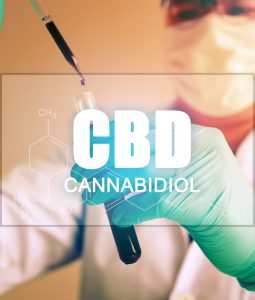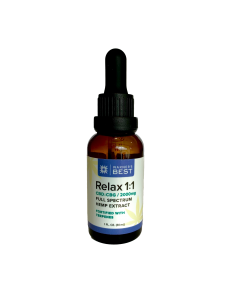
Although cannabidiol (CBD) has become rather popular in the realm of wellness products over the last few years, there are still a lot of questions and skepticism surrounding it. According to a 2019 Gallup poll, 35 percent of American’s are not familiar at all with CBD, while 14 percent regularly use CBD oil products. Let’s dive into some of the most commonly misunderstood CBD facts to help you better understand CBD oil.
-
1. CBD Is Legal
The controversial aspects surrounding CBD stems from the fact that CBD is sourced from cannabis, the plant family that encompasses marijuana and hemp. Hemp-derived CBD was legalized at the federal level in the 2018 Farm Bill, also known as the Agriculture Improvement Act of 2018. The Bill legalized the growth and manufacturing of hemp that contains extremely low levels of THC. This bill also gave states the ability to further regulate CBD as they choose. It took some time, but CBD is now legal in all 50 States with varying degrees of restrictions. Some states have only legalized THC-free CBD oil while others have adopted the federal regulations on hemp-CBD, which allow plants and products with less than 0.3% THC. Since state laws surrounding CBD oil vary, there is often confusion and misunderstanding about the legality of CBD in the United States.
-
2. CBD Doesn’t Get You High
There are many misconceptions about CBD, but one of the biggest misunderstandings is that it makes you high, which is absolutely not the case. Tetrahydrocannabinol (THC) is the cannabinoid found in cannabis plants that cause the “high” or intoxicating effect in users. THC is not legal at the federal level, although some states have chosen to legalize medical THC or decriminalize it entirely. Hemp or cannabis plants that are typically used for making CBD products contain only trace amounts of THC(less than 0.3% THC).
Legal hemp-derived CBD cannot contain more than 0.3 percent THC. Since CBD oil contains such small amounts of THC, and CBD counteracts the intoxicating effects of THC, CBD will not create a high effect on the user whatsoever. There are some CBD oils that contain zero traces of THC for those who live in states where even trace amounts of THC are illegal or for those who may be concerned about taking CBD with traces of THC.
-
3. CBD Is Non-Habit Forming
According to recent research and addiction resources, CBD is non-habit forming and is not addictive. One study that compared the addictive properties of alcohol and opioid drugs to CBD oil found that CBD does not release chemicals in the brain that cause physical dependence, as addictive substances do. Addictive substances will cause withdrawal symptoms within the body if the substance is suddenly no longer being used. Since CBD is not addictive, it won’t cause withdrawals and the body won’t need to use increased amounts over time.
Even though CBD is generally safe to take, there are a few things that you should know about taking CBD. Some people may experience minor side effects, including drowsiness, dry mouth, lightheadedness, and low blood pressure. If you have any undesired side effects, simply stop using CBD and the side effects will subside. Although rare, it is possible for a person to be allergic to CBD oil. CBD can also interact or interfere with other medications. If you are taking any prescription medications, it is advised that you speak to your healthcare provider before taking CBD. But overall, CBD won’t cause dependency and doesn’t typically have severe adverse effects.
-
4. CBD Works With The Human Body’s Endocannabinoid System
The human body has an endocannabinoid system, which interacts with chemicals called endocannabinoids that the body produces naturally, which are extremely similar to the cannabinoids of the cannabis plant, such as CBD, CBG, CBN, and THC. Endocannabinoids regulate many functions within the body by interacting with the cannabinoid receptors that are sprinkled throughout the body in the brain, organs, tissues, glands, and immune system. The functions that the endocannabinoid system regulates include mood, appetite, memory, discomfort, relaxation, sleep, and immune function. When the body doesn’t produce enough natural endocannabinoids, these functions may be negatively affected. When CBD enters the body, it acts in the same way as an endocannabinoid by interacting with the endocannabinoid system to help return the body’s functions to a balanced state. Even if your body does produce enough endocannabinoids, CBD can help give your system an extra boost to enhance your endocannabinoid levels and influence the cannabinoid receptors to work more efficiently.
-
5. CBD Is Safe For Pets
You may have heard of people using CBD oil for dogs. CBD is pet friendly and can help with a variety of ailments. Like humans, animals also have an endocannabinoid system within their body that can benefit from  CBD oil. CBD can help pets by alleviating discomfort, improving relaxation, and have a calming effect on the animal. CBD is plant-based and naturally occurs in pets’ bodies, just like humans, so it is quite beneficial and completely safe. If these side effects occur, they should go away once the CBD has left the animal’s system and is no longer being given to the pet. Adverse effects from CBD are very rare. Overall, CBD for pets can be a safe and effective supplement to add to your dog, cat, or even horse’s diet to keep your pet healthy and happy.
CBD oil. CBD can help pets by alleviating discomfort, improving relaxation, and have a calming effect on the animal. CBD is plant-based and naturally occurs in pets’ bodies, just like humans, so it is quite beneficial and completely safe. If these side effects occur, they should go away once the CBD has left the animal’s system and is no longer being given to the pet. Adverse effects from CBD are very rare. Overall, CBD for pets can be a safe and effective supplement to add to your dog, cat, or even horse’s diet to keep your pet healthy and happy.
-
6. CBD Oil Is Not The Same As Hemp Seed Oil
The difference between CBD oil and hemp seed oil is hard to pin-point, since different people or companies each use these terms differently. CBD oil refers to oil extracted from the hemp plant that contains high levels of CBD. But CBD oil may or may not contain other cannabinoids and terpenes from the hemp plant as well. Some would call this full-spectrum CBD oil hemp oil, but some are referring to hemp seed oil when they say hemp oil.
-
7. Not All CBD Oils Are The Same
Those new to purchasing CBD oil may not be familiar with the different kinds of CBD and the important things to look for when searching for a reliable CBD product. Full-spectrum CBD means it contains the full array of compounds found in the plant it was extracted from, including cannabinoids, terpenes, and flavonoids. So, full-spectrum CBD oil has mostly CBD, but also contains other chemicals found in the plant which can provide a wide array of benefits. Isolate CBD is pure CBD, with all other compounds from the cannabis plant removed, and only the crystalline or powdered form of CBD left. There are different benefits and uses for each kind of CBD oil.
Another important thing to consider is that some CBD companies may not adhere to FDA regulations, labeling requirements, and testing standards. Since CBD oils are not all manufactured the same way, it is important to look for a few things to determine if the CBD is real and safe to use. First, make sure the CBD oil is tested to determine the purity and potency of the CBD is accurate and legal. For example, Warner’s Best CBD tests all of our products internally and sends each batch out for third-party testing as well, and publishes all of our CBD lab reports for the public to see. Second, make sure the hemp that is used to manufacture the CBD is grown in the United States. Third, make sure the ingredients that are listed on the CBD product are recognizable to you. This is to avoid using CBD with unknown, unregulated, and potentially dangerous ingredients.
-
8. CBD Works Best With Other Cannabinoids
CBD is only one of 113 cannabinoids found in cannabis plants. When CBD is extracted from the whole plant and left in full-spectrum form with other cannabinoids and terpenes, the CBD oil tends to be more effective in the human body. One study found that the full-spectrum CBD had faster and better results than the CBD isolate, which didn’t contain other cannabinoids. The other cannabinoids help speed up the metabolism breakdown and help process the CBD more quickly within the body for faster absorption.

-
9. Flying With CBD Is Legal
According to the Transportation Security Administration (TSA), passengers are allowed to travel with hemp-derived CBD that contains no more than 0.3 percent THC and does not exceed the 3.4-ounce liquid limit. However, TSA agents are required to report any state or local violations that they may suspect. This especially pertains to states that continue to deem CBD with THC illegal. Make sure the CBD you are flying with is legal in the states you are flying to and from in order to avoid chances of legal issues.
-
10. CBD Is Not Psychoactive
Many users wonder whether CBD is psychoactive, since CBD affects the mind because of the way it affects mood, cognitive function, and memory. However, due to the fact that CBD does not produce a “high” in the user like THC, CBD is widely recognized (including by the US Federal Government) as being non-psychoactive. For a clearer understanding of the concept, a better way to describe CBD in comparison to THC would be to say it is non-intoxicating. Intoxication means physical and mental functions are diminished due to a substance. CBD oil does not diminish the functions of mental or physical abilities, it simply affects the mind by interacting with cannabinoid receptors in the brain to improve mood and promote relaxation.
The content on this site is not intended to be a substitute for professional medical advice, diagnosis or treatment. While research has shown that CBD has the potential to help provide beneficial outcomes for several complaints, it is advisable to seek the advice of a physician or other qualified healthcare provider when you have questions regarding any medical condition and when starting, augmenting or discontinuing any existing health routine.
